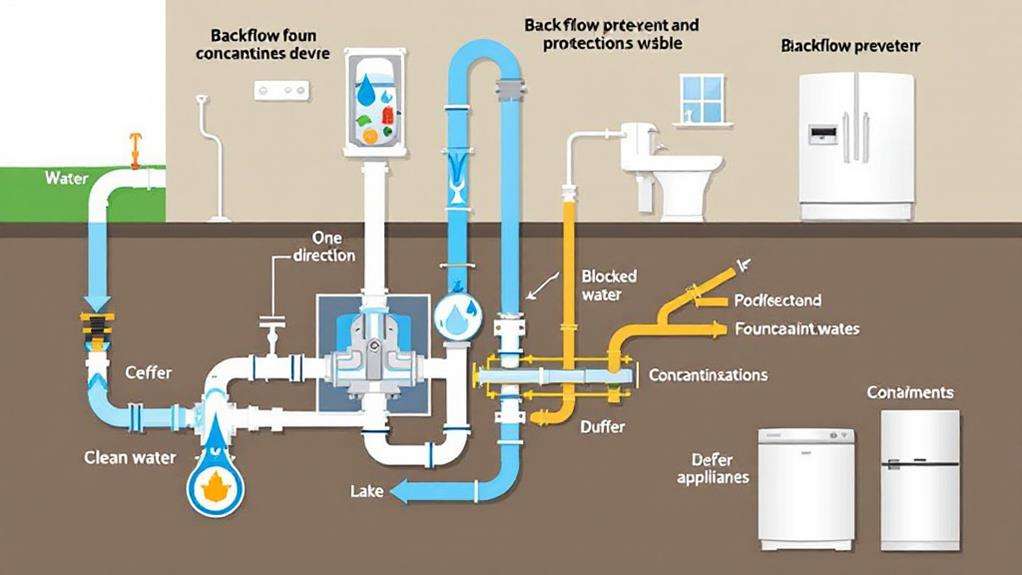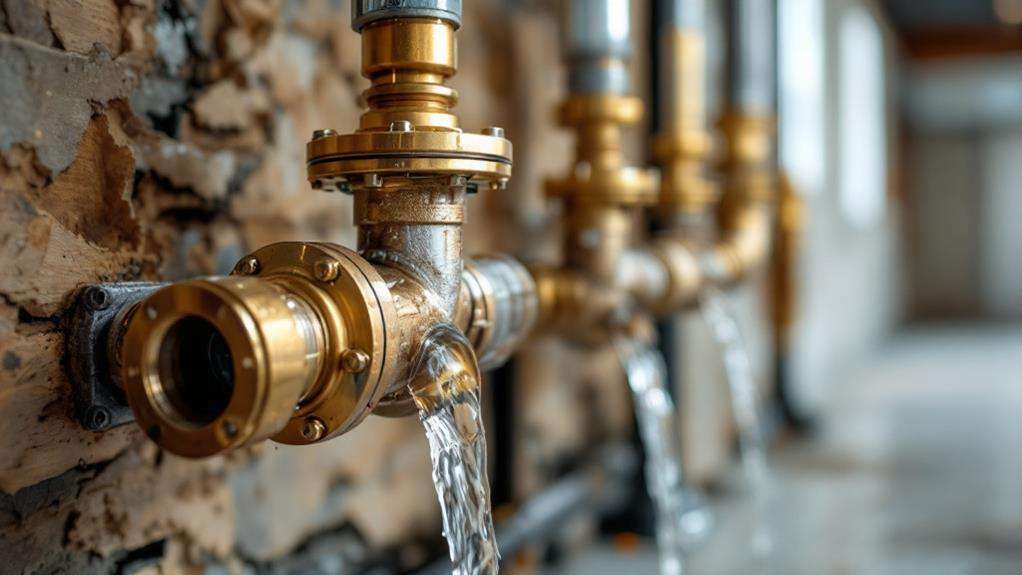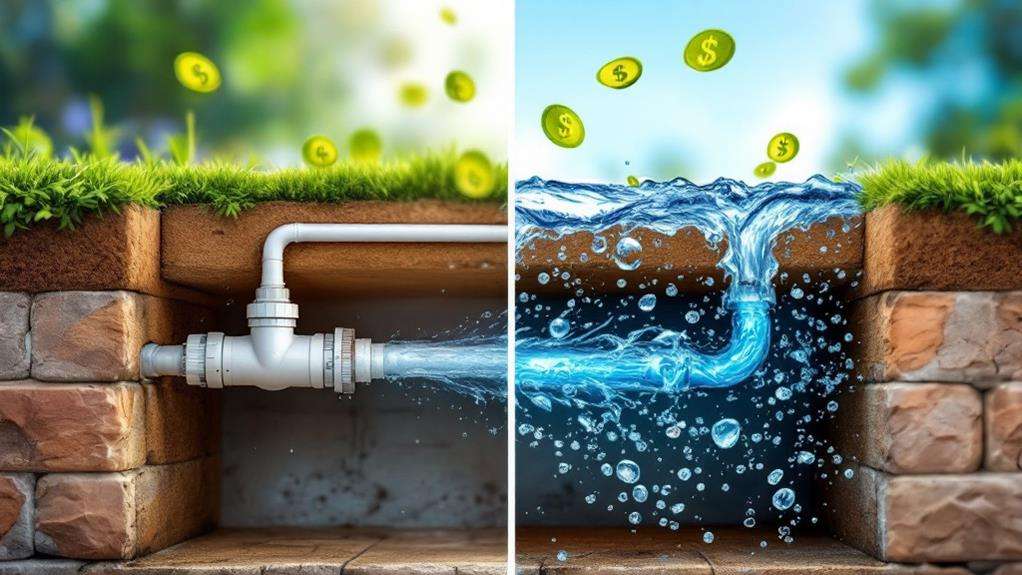The Benefits of Installing a Backflow Preventer in Your Home

Installing a backflow preventer in your home offers numerous benefits. It protects your water quality by preventing contaminated water from flowing back into your clean water supply. You'll comply with local regulations, avoiding potential fines or service disconnections. Your plumbing system will be safeguarded against damage caused by contaminated water, reducing the risk of costly repairs. Most importantly, you're protecting your family's health by ensuring clean, safe drinking water. Long-term cost savings are another advantage, as you'll prevent expensive plumbing issues and improve energy efficiency. Uncover how this simple device can provide peace of mind and significant advantages for your household.
Protecting Water Quality
Countless households and businesses rely on clean, safe water every day. Installing a backflow preventer in your home is essential for protecting this indispensable resource. Backflow preventers act as a one-way valve, ensuring that contaminated water doesn't flow back into your clean water supply. This simple device safeguards your family's health and the community's water quality.
By preventing contamination, backflow preventers contribute to increased water efficiency. They reduce the need for extensive water treatment processes, saving energy and resources. This, in turn, leads to a reduced environmental impact as fewer chemicals are required to purify water supplies.
You'll also benefit from peace of mind knowing that your drinking water is protected from potential hazards like pesticides, fertilizers, or sewage. Backflow can occur due to various reasons, including changes in water pressure or faulty plumbing. With a properly installed backflow preventer, you're taking a proactive step to maintain water quality.
Compliance With Local Regulations
Installing a backflow preventer isn't just about protecting water quality; it's also a matter of legal compliance. Many local municipalities and water authorities have strict regulations requiring backflow prevention devices in residential and commercial properties. By installing a backflow preventer, you're meeting code requirements and avoiding potential legal penalties.
These regulations are in place to safeguard public health and maintain the integrity of the water supply system. Failing to comply can result in hefty fines, legal action, or even the disconnection of your water service. It is crucial to familiarize yourself with your local ordinances and make certain your property meets all necessary standards.
When you install a backflow preventer, you're not only protecting your own household but also contributing to the overall safety of your community's water supply. Many areas require annual inspections and certifications of backflow prevention devices to guarantee they're functioning correctly. By staying on top of these requirements, you'll avoid legal issues and demonstrate your commitment to public health and safety. Remember, compliance isn't just about avoiding penalties; it's about being a responsible member of your community and protecting our shared resources.
Preventing Plumbing System Damage

A major benefit of backflow preventers is their ability to protect your plumbing system from damage. These devices act as a barrier, preventing contaminated water from flowing back into your clean water supply. By installing a backflow preventer, you're not just avoiding water contamination but also safeguarding your pipes, fixtures, and appliances from potential harm.
When contaminated water enters your plumbing system, it can introduce harmful substances that corrode pipes, damage seals, and compromise the integrity of your entire water network. This can lead to leaks, burst pipes, and even complete system failures. By thwarting this backflow, you're minimizing property damage and potentially saving thousands in repair costs.
Additionally, backflow preventers help maintain the efficiency of your plumbing system. They guarantee that water flows in the intended direction, reducing strain on pipes and fixtures. This can extend the lifespan of your plumbing components and improve overall water pressure throughout your home. You'll also avoid the inconvenience and health risks associated with contaminated water, ensuring that your family has access to clean, safe water at all times.
Safeguarding Family Health
Beyond protecting your plumbing system, backflow preventers play an essential role in safeguarding your family's health. These devices guarantee that contaminated water doesn't flow back into your home's clean water supply, substantially improving sanitation and reducing the risk of disease transmission.
When you install a backflow preventer, you're creating a barrier against harmful bacteria, chemicals, and other contaminants that might otherwise enter your drinking water. This is particularly important if you have a sprinkler system, pool, or other outdoor water features that could potentially introduce pollutants into your plumbing.
You'll also protect your family from the dangers of cross-connections, where non-potable water sources accidentally mix with your drinking water. This can happen during pressure changes in the municipal water system or when using certain appliances. By preventing this mixing, you're ensuring that the water coming out of your taps is always safe to drink, cook with, and bathe in.
Moreover, backflow preventers contribute to community health by preventing contamination from spreading beyond your property. You're not just protecting your family, but also your neighbors and the wider community from potential waterborne illnesses.
Long-Term Cost Savings

While the initial cost of a backflow preventer might seem high, you'll find that it offers significant long-term savings. By preventing contaminated water from entering your home's plumbing system, you'll reduce the risk of costly repairs and replacements for pipes, fixtures, and appliances. This protective measure translates to reduced maintenance costs over time.
You'll also benefit from improved energy efficiency. When backflow occurs, it can lead to decreased water pressure and flow, causing your water heater and other appliances to work harder. With a properly functioning backflow preventer, your systems operate more efficiently, consuming less energy and lowering your utility bills.
Furthermore, you'll avoid potential fines and penalties associated with non-compliance of local water regulations. Many municipalities require backflow preventers for residential properties, and failure to install one could result in hefty fines. By proactively installing a device, you're safeguarding yourself against these unexpected costs.
Lastly, a backflow preventer can increase your property value. Potential buyers will appreciate the added protection and peace of mind, potentially leading to a higher resale value for your home.
